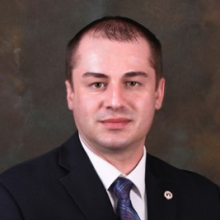Michigan Farm Bureau is supporting proposed changes to the state’s hunting and fishing license fees that would strengthen deer population management tools for farmers while reducing the cost burden of preventing crop damage —which they already pay for in lost yield.
At a June 12 joint committee hearing of the Senate Appropriations Committee and the Senate Natural Resources and Agriculture Committee, MFB Legislative Counsel Andrew Vermeesch described the growing impacts of overpopulated deer herds on Michigan farms, and how proposed amendments to Senate Bills 276 and 277 — sponsored by Sens. John Cherry (D-Flint) and Jon Bumstead (R-North Muskegon) — would provide common-sense relief to farmers.
“Michigan's mild winters, an abundant food supply, and a steady decline of hunters, has created a perfect storm for populations to continue to increase, and with that comes increased crop damage,” Vermeesch said.
“Crop damage is not new. It's something that we've dealt with for quite some time with our members. However, the issue is getting worse.”
Vermeesch outlined how farmers not only experience profit loss from deer damage annually but also must currently pay out of pocket for permits to deter further losses.
Proposals under discussion would reduce the cost of Deer Management Assistance Permits (DMAPs) from $10 to $1 and drop antlerless deer permit fees from $20 to $5, while raising the antlered deer permit fee from $20 to $25. The changes aim to encourage hunters to harvest more does, a key to population control.
“The bill before us today looks to fix that and recognizes the fact that farmers are already paying for the damage — why are we penalizing them and making them pay more, just to protect their livelihood?” Vermeesch said.
“There’s no question that we harvest a lot more antlered deer than antlerless deer in Michigan, and we have an overpopulation problem, so different ways we can incentivize and encourage individuals to shoot more antlerless deer we need to do — and reducing that cost is a huge step in the right direction to prioritize antlerless harvest during the hunting season.”
While the changes would ease costs for farmers, they are part of a broader conversation to modernize the state’s license structure and recognize declining participation among hunters and anglers.
“When we talk about wildlife management, fisheries management, it's really a user-funded activity, so that's funded primarily through hunting and fishing licenses,” Sen. Cherry said. “Nationally, we’ve seen decreases in participation, so we've had a declining revenue source, while the demands for the revenue have increased, which leads us to the challenge that we have.”
Sen. Bumstead added historical context, noting the state’s last major license restructuring occurred more than a decade ago.
“Michigan's hunting and fishing license fee structure last underwent major changes back in 2013 when I led the fight as a state representative,” Bumstead said. “Since then, rapid inflation [and] rising operational costs have dramatically cut into the DNR’s ability to effectively manage our natural resources.”
In addition to the changes in deer permit pricing, Senate Bills 276 and 277 would also:
- Increase the resident base hunting license fee from $10 to $15 and raise the associated surcharge from $1 to $5 to sustain support for the Michigan Wildlife Council, hunter and angler recruitment and education efforts, and the Hunters Feeding Michigan venison donation program.
- Authorize the Natural Resources Commission to establish “earn-a-second-buck” rules, requiring hunters to harvest an antlerless deer before using a second buck tag.
- Update fees for other species and fishing licenses.
No action has been taken by the committee at this time and, according to Vermeesch, legislative discussions on this issue are still in the early stages.
Alongside Farm Bureau, the Michigan United Conservation Clubs and the Michigan Pheasant Hunting Initiative have also voiced support.
Share Story
Article Tags


